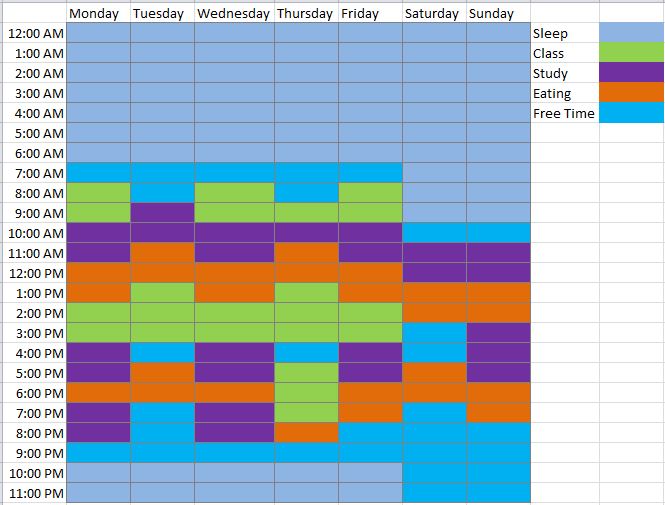Today’s post is all about Time Management. Every student starts the semester with the goal of achieving academic success, but it is hard to turn dreams into realities without a plan. The most effective way you can set yourself up for a great semester is to have a Time Management Plan. First, we will discuss some misconceptions about good time management, and then we will provide tips on how to create a plan for good time management.
♦TOP 3 MYTHS OF GOOD TIME MANAGEMENT♦
1. Managing my time means eliminating my social life. You can breathe a sigh of relief: a well-balanced schedule should allow for an active social life. Managing your time wisely does not mean eliminating areas of your life that you enjoy or that are necessary for physical and mental health (i.e. sleeping). Instead, good time management means bringing your social life into balance with your academic life.
2. I don’t need to personalize my schedule, I can just copy someone else’s. We all learn and spend our time differently, so if you want your time management plan to survive longer than a couple of weeks you need to personalize it as much as possible. If you know it is not realistic for you to study for 3 consecutive hours, then don’t. Instead, set aside more frequent study sessions that last for shorter time periods. Make sure your schedule is realistic and reflects who you are as a learner and as an individual.
3. Managing my time well means I cannot be flexible. This is one misconception that has some truth in it. Life happens. You cannot plan for something that is unforeseen, BUT that does not mean a detailed weekly study schedule is not helpful. Schedules are good guideposts, or roadmaps, that can show you where you want to go and how to best get there. Sometimes you may have to take a detour, but that does not mean you should throw out your map. The principles that went into creating your schedule still hold true. If you get caught up in a traffic jam or are surprised by a friend in town for a night, you can still refer back to your original plan to see what you missed and to create a plan to get back on track.
Now that we have cleared up some misconceptions, let’s talk about how to create a plan for good Time Management:
♦TOP 5 TIME MANAGEMENT TIPS♦
Be specific in Your Time Management Plan – Start your time management plan by identifying class time and other obligations that happen at a fixed time each week, then try to break out busy days into more specific daily plans. Utilizing a planner or calendar that allows you to plan out an entire month in broad strokes can be helpful, but it can be more useful when you create daily action plans (i.e. what are you going to do during the day to accomplish what you need to? For example, write at least a page for the English paper you know is due next week OR complete x number of chemistry homework problems).
Do not Limit Yourself to One Type of Studying – Study can mean a variety of things. It does not have to mean merely reading the textbook or doing your homework. It can also mean going to the tutoring center, meeting with a study group, making flashcards, etc.
Know Your Limits as Well as Your Strengths – There is debate on the average person’s attention span. Some would say it is around 10 minutes, while other research suggests that the average attention span is around 40 minutes; either way, don’t study for too long at any one time. Break your time up into smaller sections or change location as you switch from task-to-task. Sometimes a change in venue can help you refocus for another 10-40 minutes.

Be Realistic – Review the schedules and action plans you create. Ask if it is realistic for you to fulfill. If you are not a morning person then try to schedule things for later in that day, or if you see that given your schedule you would need to study for 8 hours on Saturday to fit everything in, try to move things around to help make everything more manageable.
Be Flexible – If something important comes up during your regularly scheduled study time, that’s okay. If you have a schedule, you can see what you would have to change over the next few days to make up for that lost time. In this way schedules actually help you be more flexible with your time. Just make sure that you make up for any missed study time somewhere else in your schedule – preferably from free time (not sleep or eating or other essential life functions).
Here is an example of a Weekly Schedule that can work as a broad guideline for your academic week.
With this schedule even sleep time is listed on the plan. Again, this is not meant for strict adherence, but it is a guidepost to help organize each day and week, and understand what each day demands. This schedule was created in Excel and it is extremely general, but we encourage every student take a few minutes to jot down a basic weekly schedule. Here is a list of apps that can also help you stay organized and manage your time wisely:
 Evernote – Allows you to store content in a cloud and access it from multiple devices. Upload lists and notes and access them from the cloud.
Evernote – Allows you to store content in a cloud and access it from multiple devices. Upload lists and notes and access them from the cloud.
 Chegg – Book rental, buy back, and planner/scheduler help.
Chegg – Book rental, buy back, and planner/scheduler help.
 Clear – Create to-do lists and manage them in a user friendly app.
Clear – Create to-do lists and manage them in a user friendly app.
 Study Buddy – Keep track of the breaks you take during your studying to help maximize your study time and habits.
Study Buddy – Keep track of the breaks you take during your studying to help maximize your study time and habits.
If you know of other good apps or time management tips, be sure to share in the comments below!



